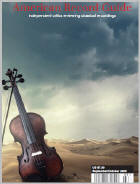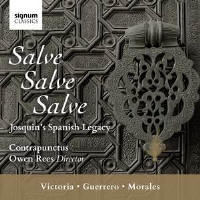Texte paru dans: / Appeared in: Signum |
|
|
Outil de traduction ~ (Très approximatif) |
|
|
Reviewer: Charles
Brewer Fermer la fenêtre/Close window
It is perhaps a bit misleading
to title this recording "Salve, Salve, Salve: Josquin's Spanish Legacy" when
his only selection is a 'Salve Regina'. Rather than a collection of
Josquin's music found in the Iberian peninsula, it tells a sonic story of
how his music was heard, imitated, and integrated into the compositions of
Spanish composers in the 16th Century. The title is actually a reference to
Josquin's 'Salve Regina', which incorporates an ostinato in the "Quinta Vox"
derived from the first four notes of the most common chant for this Marian
antiphon (also included on the recording), so that you hear from this voice
only "Salve, Salve, Salve...".
This recording is not an
academic exercise. The ten core singers of Contrpunctus produce a full and
blended sound and Rees leads them in interpretations that are sensitive to
the subtle rhythmic inflections of these densely polyphonic works. Compared
to other excellent recordings of the Gaudeamus Mass, it does not have
Cardinall's Musick's fuller mixed chorus sound (May/June 2000) or the adult
male chorus sound of the Westminster Cathedral Lay clerks, which John Barker
rightly described as "luminous, with an edge" (Nov/Dec 2009). In a number of
respects it is equal to Michel Noone's interpretation included on his ten
disc survey of Victoria's music with Ensemble Plus Ultra (2011, DG 4779747).
Any of these performances are better than the idiosyncratic arrangement for
single voices and organ by Musica Ficta (Sept/Oct 2001), which is the only
other recording to include the Morales motet; but, on that release, voices
only sing
the
ostinato, not the topical text. Like a good story, following the "plot"
supplied by Rees's selection, you reach a deeper understanding of the deep
creativity and beauty of these three Spanish composers in responding to what
they heard in Josquin's music. | |
|
|
|
|
Cliquez l'un ou l'autre
bouton pour découvrir bien d'autres critiques de CD |
|




